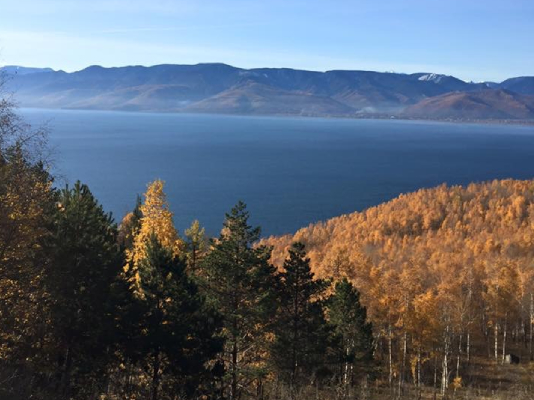
Checkhov pronounced Irkutsk the Paris of Siberia when he first laid his eyes on this city by the river Angara. It might be a stretch to imagine that after the Soviets did their sweep of all that it stood for in the past. Stalin leveled the magnificent orthodox Cathedral of the Blood, the biggest in Russia, and only its belfry remains today. The Church of the Epiphany, with its ceiling and walls covered with brilliant frescoes was painted over and its iconostasis dismantled and reused as crates. All the other churches met the same fate. Irkutsk, tolerant of all religions then, had a gothic Catholic cathedral, and there were mosques and synagogues, all with their distinctive architecture. Stalin also demolished the traditional wooden houses, with their painted shutters and filigreed window frames. He replaced them with utilitarian boxy Soviet mass housing and his public buildings were poured from the same cast, a hybridized classical style built with massive proportions and arose from the destruction of everything associated with Russia’s Tsarist and christian orthodox past. It’s monuments and statues were toppled and upon their rubble, Lenin and other Soviet idols were installed. Today, in its bid to jump onto the lucrative tourism bandwagon, Russia is trying to bury its recent ignominious past by reclaiming its old glory in the distant past. Demolished cathedrals, palaces, and rich merchant mansions are being rebuilt. Fortress-like work, shopping, and residential spaces are being replaced by open squares and gardens, pedestrian shopping malls and open streets. Cafe and bar culture is thriving, and consumer goods overflow from store shelves, that even those who lived through the repressive years have forgotten what that was like. That past is past, we don’t have to bring it up. Let’s bring on the Tsars and the church and make money off the tourists and reestablish our reputation and supremacy. Irkutsk may reclaim its fame yet as the Paris of Siberia.
What cannot be replaced once destroyed is the land. Siberia is where the Soviets focus their development efforts to catch up with western Europe and the USA and to translate its ideology. Its great rivers are dammed, its path diverted to irrigate parched lands, subsistence family farming is replaced by collective agriculture. Coal and oil and minerals are extracted from the earth’s core and waste poured into lakes and rivers, changing the biological balance of the environment drastically. Siberia’s permafrost is melting and if nothing is done its cities may soon be floating on the ice. The Tran-Siberian railway is witness to these industrial cities that line its route, from Moscow, in western Europe to Vladivostok in the east.
Russia’s territory overwhelms. Near Irkutsk is Lake Baikal, the biggest and deepest fresh water lake in the world. It can hold all the Great Lakes of north America easily. Thankfully its sheer size is able to withstand its industrial abuse, and with its UNESCO World Heritage protected designation, its pristine grandeur can be preserved for subsequent generations to marvel at. And marvel at I do.
Lake Baikal
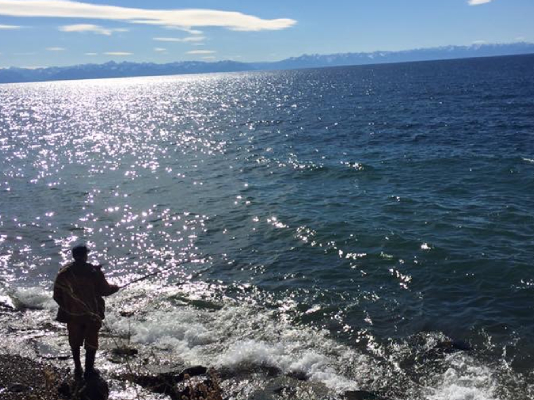
As the train rounds the southeastern shore of Lake Baikal, the track follows it so close, you can almost touch the water. Its water is like crystal, the visibility is clear up to a depth of forty feet. The lake area is a popular destination for hiking, camping, fishing, all manner of outdoor activities. When the temperature gets down to below freezing, visitors warm up with a Russian banya. Naturally, I must have it and my B&B offers it. I roast in a sauna wearing a felt hat to protect my head from the intense heat. After sweating, I am thrown into an outdoor freezing pool and rewarmed in the sauna. Nikolai, my B&B host and banya guide, wearing his organ-clinging brief swimming trunk, takes a clump of birch branches moistened in very hot water, the banny venik, and hits me firmly with it, from head to toe. The flogging is supposed to improve circulation and to reinvigorate. This sequence is repeated as tolerated. I give up after one sequence. Nikolai leads me to another hot room where he pours warm water over me and covers me with lavender suds and scrubs me until I am tingly all over. I rinse and step off the sauna. I ask Nikolai to pour me a shot of vodka and I sleep great.
Snow-capped but slowly melting with development
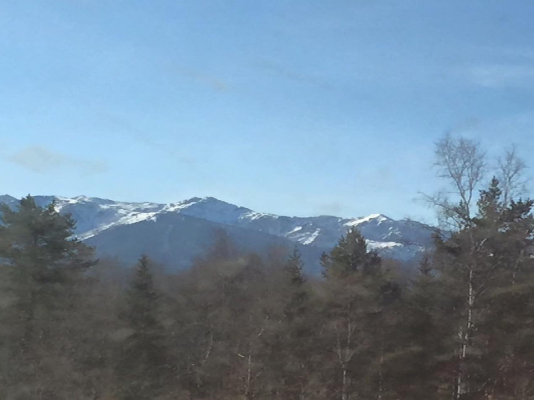
For hours on end looking out the window, the vast expanse of Siberia unfolds. The thick forest of birch trees, the symbol of Russia, lines the railway corridor, first in full autumn colors of sunny gold on pristine white trunk and branches. Gradually the bottom leaves have fallen, leaving skeletal white branches holding the golden crown, and then the trees are naked and ghostly in their white bodies. As the train hurtles forward, these trees are incrementally replaced by conifers. The mesmerizing blur of gold and white is darkened by the green of spruce and pine, and later when the birch disappears the deciduous larch conifers replace the buttercup yellow of birch with its own autumn golden mustard glow.
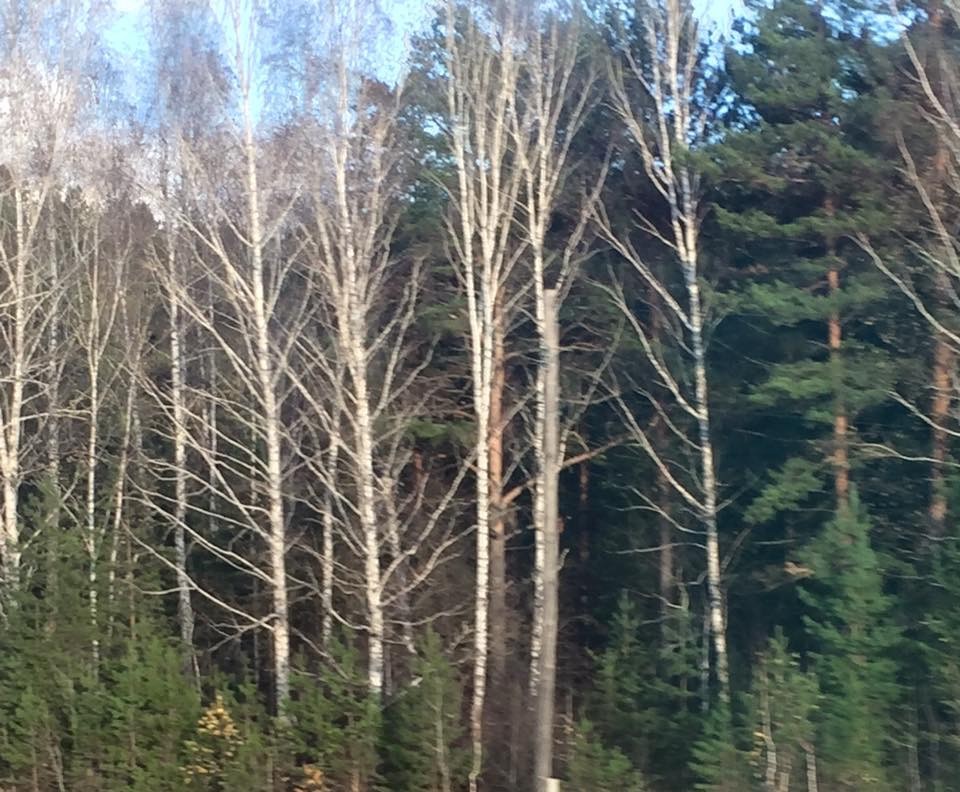
After eight hours we stop at Ulan Ude, the last major train junction. There are many trains in both directions passing through, long chains of iron boxes carrying the bounty of Siberia to the world. A train passes next to us blocking our view for minutes. I counted more than forty-five metal tube tankers linked together like a tennis bracelet, ferrying oil, almost a mile long. Another four hours and we reach the Russian border at Naushki. Border police mounts the train in full regalia. We are ordered to remain in our compartments. My visa is scrutinized menacingly. Flashlight is shined on my face and my visa photo and my passport photo checked against my visage. All the numbers in my documents are checked for agreement. Then an unsmiling scrutiny of my face and photos again. Then another appears, orders me to step out and mounts my berth and upturns lids and whatever is up in the ceiling, looks under the seat, shakes the walls, checks the coat closet and sink/shower room, flashes light in every nook and cranny. He leaves without any acknowledgment, but his dusty footprint on my comforter. I assume inspection is over but I am deterred from reentering by another, leading a sniffing dog. We are at the border for 110 minutes.
After Ulan Ude the landscape gradually loses the trees and bronzed low shrubs and undulating brown grassy pastures that looked like windswept dunes in the distance appear. Rivulets slash the terrain here and there and grazing cows and sheep materialize from nowhere transforming the desert into a bucolic scene.
Siberia towards the Mongolian border
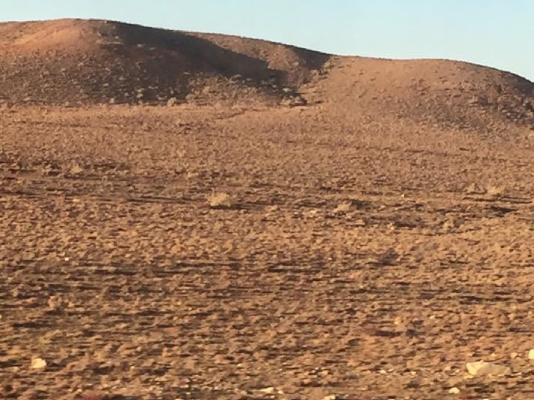
I have exclusive use of my double berth first class train compartment, thankfully. We are using an obviously older train that still shovels coals to keep the water on the communal samovar heated. The brocade upholstery and curtains have lost their brilliant colors, and the shared shower-vanity closet between two compartments has mildewed grouts and smells of urine, despite a toilet. I ask it be cleaned, but the odor remains. Unlike the Russian female provodnistas, who are clean-freaks, their male Mongolian counterparts are laid-back. This trans-Mongolian train can use a thorough vacuuming and scrubbing and refurbishing. I also have to make my bed but thankfully, the linen provided are crisply ironed and spotless. As the train chugs towards Suhe Bator, the Mongolian border, ice-peaked mountains frame the horizon before darkness obliterates the view. But not before I am treated to a dazzling display of pink, lavender, and orange swoosh of sunset against blue sky and cottony cirrus clouds. Mongolian customs agents board the train. One looks in on me, smiles and hands me an immigration document to fill up. Another stops to collect my passport while I am still completing the document, signs he’ll return for the paper, and smiles and waves good bye. A flustered young female agent, looking smart in her uniform, apologizes and hands me a customs declaration to complete and asks if I have any drugs. I show her my Benicar antihypertensive and Calcium pills, and she says that’s OK, and sorry, collects both my papers and says goodbye with a smile. Later, the first guy returns and hands me my passport. The train maneuvers to switch the dining car. The two ladies from Denmark in the adjoining compartment, who I share the sink/shower closet with, have not eaten dinner yet, and it is past 11 pm. I am smarter and have dinner in the Russian dining car before we arrive at the border. After 105 minutes, the Mongolian diner is attached and we are on our way. Overnight on the train and I awake to the glimmer of dawn outlining the mountains surrounding Ulan Bator, and the night sky twinkling with the brilliant light of Saturn, Jupiter, and Venus. As the train decelerates to the station, the sky bursts in pinks, soft oranges and golden yellows of morning